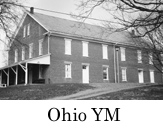The following is the entirety of Meyers's essay:
One first day morning, I think it was in the spring of 1872, word went round the little village of Pennsdale, Pa., that strangers were to be at Muncy Meeting located there, and it was desired that the members generally should be apprised of the fact. In that remote neighborhood, few strangers ever visited us, except an occasional minister or some member of a committee from Philadelphia. The arrival of these two Friends the evening before, entirely unheralded, awakened no little curiosity, and something of the feeling as if they had come from nowhere, and the meeting was largely attended and quite satisfactory. The friends proved to be John Brantingham and his companion Abner Woolman, on their way to attend Philadelphia Yearly Meeting. John appeared in the ministry that day, though what he said did not remain in my memory; but the sobriety and solidity of their manners and conduct did make a strong impression on my mind. They were different from what we were accustomed to, as the members of that meeting were quite lax in observing many of the testimonies of Friends. In the afternoon we went to our cousins where they were being entertained and had a pleasant social call with them; the hostess remarking, as we entered, that they were well worth coming to see. This was my first contact with Ohio Friends; silently they slipped away from us at the time as unobtrusively as they had come, and little was heard of them afterwards. Later when I attended Ohio Yearly Meeting for the first time in 1880, I found John Brantingham one of its most esteemed ministers, a close friend of Elwood Dean, Louis Taber and Friends of that class, and one whose ministry was calculated to make a favorable impression on his hearers. During the course of this yearly meeting, a sermon which he delivered in which he spoke concerning those who were trying to get a little ahead of everybody else, may be cited as a rebuke to that spirit of pride so characteristic of the human heart. He did not live long after this, so I never heard him again. His death in 1884 was felt as a decided loss to the Yearly Meeting. He had appeared in meeting a good many years before he was recommended as a minister, and when it was finally done, it seemed to be a strength to him, the sanction of the meeting and the approval of his Friends no doubt giving encouragement in the development of his gift. This shows the necessity that Friends should not withhold longer than is meet the recognition of such gifts, lest it cause a loss both to the individual and the meeting.
|






